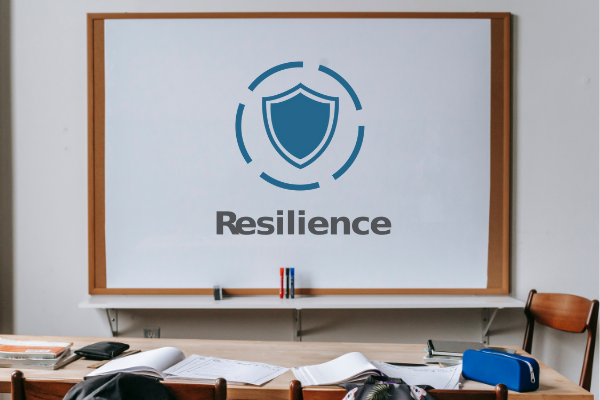Teacher Resilience: “The Persistence of Hope”
February 2022
As we approach two years since the start of COVID-19 restrictions here in the UK, many people can’t help but to consider and praise the resilience of essential workers in healthcare, emergency services, and education. After two years of lockdowns, social distancing, and prolonged isolation, it is easy to see how a commitment to any career is indicative of a strong, resilient nature.
Nevertheless, it is important not to assume that resilience comes in infinite amounts; an individual’s capacity for resilience can grow and fall from day to day. This is well-exhibited in the teaching profession, where resilience has been shown to be a key factor contributing to teacher success and commitment (Sautelle et al, 2015). So how can we increase teacher resilience?
“The persistence of hope”
The OED defines resilience as “the ability of people or things to recover quickly after something unpleasant, such as shock, injury, etc.”, but researchers in teacher resilience, such as Christopher Day and Qing Gu, suggest that it goes beyond that. Yes, the ability to bounce back from adversity is a cornerstone of resilience, but it is also important to consider resilience over the course of a career.

Day and Gu’s 2013 monograph has a particularly striking discussion of teacher resilience, associating it with “the persistence of hope and endeavour among teachers to do their best to reach and engage every student in learning which will benefit them, regardless of the challenges which this may bring”. Resilient teachers don’t just get through the day by any means necessary, they look after their mental and physical wellbeing in a way that protects them somewhat from the long-term stresses that they may face. Moreover, Day and Gu suggest that “resilience is not a quality that is reserved for the heroic few. Rather, it can be shared by many ordinary teachers who remain extraordinarily committed to serving the learning and achievement of the children on an everyday basis and also over the course of their professional lives.” This message is especially potent in current circumstances, where comments about heroic resilience can overlook the difficulties of maintaining commitment to a profession in today’s world.
Why is teacher resilience important?
Due to the challenges and stresses inherent to teaching, it is regarded as highly stressful compared with other occupations. This stress can lead to a particularly high burnout and resignation rate, Gu noting that statistics suggest teaching is one of the most stressful professions in the twenty-first century, exhibiting a relatively higher turnover rate than many other careers (2014). All of this indicates that resilience is an important element of teacher success. Research into resilience suggests that it is associated with increased job performance and satisfaction in a number of professions, protecting against stress and burnout, and increasing the likelihood of long-term job commitment (Sautelle et al., 2015).
In addition to the everyday stresses and uncertainty that come with the profession, there are several specific challenges that can challenge a teacher’s ability to be resilient. For example, Day and Gu argue that, in addition to routine pressures that occur in day to day teaching, teachers also face challenges that are specific to their professional life phases (2013). Furthermore, Simon Gibbs and Andy Miller suggest that concerns around behaviour management have been found to be associated with increased stress and burnout, lower resilience, and are a significant precipitating factor for those who decide to leave teaching (2014). When considering how to encourage commitment to the teaching profession, it becomes clear that resilience is a vital skill that should be developed.
How can we improve resilience?
Elizabeth Sautelle et al. suggest that resilience is a key indicator for Teacher Succession (2013). It is, therefore, vital to understand the ways in which resilience can be promoted, developed, and maintained (Gibbs and Miller, 2014). Gu (2014) argues that teacher resilience bears three distinctive characteristics, so how can we develop resilience in relation to these characteristics?

- Teacher resilience is context-specific: teachers’ resilient qualities are best understood in relation to both classroom, and broader professional work contexts. By promoting a supportive work environment, allowing teachers the opportunity to form bonds with colleagues, and remaining aware of issues within the wider world of education, school leaders and teacher educators can help pre-service and early career teachers to develop resilience.
- Teacher resilience is closely associated with the strength and conviction of teachers’ vocational commitment; resilient teachers last in the profession because they display capacity for growth and fulfilment in pursuit of personally and professionally meaningful goals. When faced with challenges, motivation can be found by reminding yourself of what it is you are hoping to accomplish, today, this year or over the course of your career.
- Teacher resilience is not measured by an ability to push through everyday adversity without regard for one’s physical and mental well-being but by one’s capacity to face challenges that are specific to their professional life phases. Although teachers at different stages in their careers may face different challenges, the skills required to overcome these challenges are often similar. Sacrificing your wellbeing for the sake of “resilience” will only diminish your capacity for resilience. Instead, figure out what resilience strategies work for you; whether it’s self-care, mindful reflection, or talking with a colleague, taking care of yourself is important no matter what stage of your career you are in.

Here at TSP, we have developed T-Insight. T-Insight is a scenario-based learning activity which can help pre-service and early career teachers to develop resilience. T-Insight allows participants to practice responses to a variety of classroom scenarios that they may encounter over the course of their career in a low-risk, supportive environment that is excellent for encouraging resilience. Modules focus on topics such as managing behaviour and working effectively with colleagues, which are highly relevant for all teachers. They also include the most relevant topics for a particular career stage such as time management and working with parents, for preservice teachers, and assessment & reporting and creativity & innovation in teaching, for beginning (or early career) teachers. Follow the links to find out more about T-Insight and the research supporting it.
Further Reading
Day, C., & Gu, Q. (2013). Resilient Teachers, Resilient Schools: Building and sustaining quality in testing times (1st ed.). Routledge. DOI: 10.4324/9780203578490.
Gibbs, S., & Miller, A. (2014) Teachers’ resilience and well-being: a role for educational psychology, Teachers and Teaching, 20:5, 609-621,
DOI: 10.1080/13540602.2013.844408.
Gu, Q. (2014) The role of relational resilience in teachers’ career-long commitment and effectiveness, Teachers and Teaching, 20:5, 502-529,
DOI: 10.1080/13540602.2014.937961.
Sautelle, E., Bowles, T., Hattie, J., & Arifin, D. N. (2015). Personality, resilience, self-regulation and cognitive ability relevant to Teacher Succession. Australian Journal of Teacher Education, 40, 54–71, DOI: 10.14221/ajte.2015v40n4.4.

